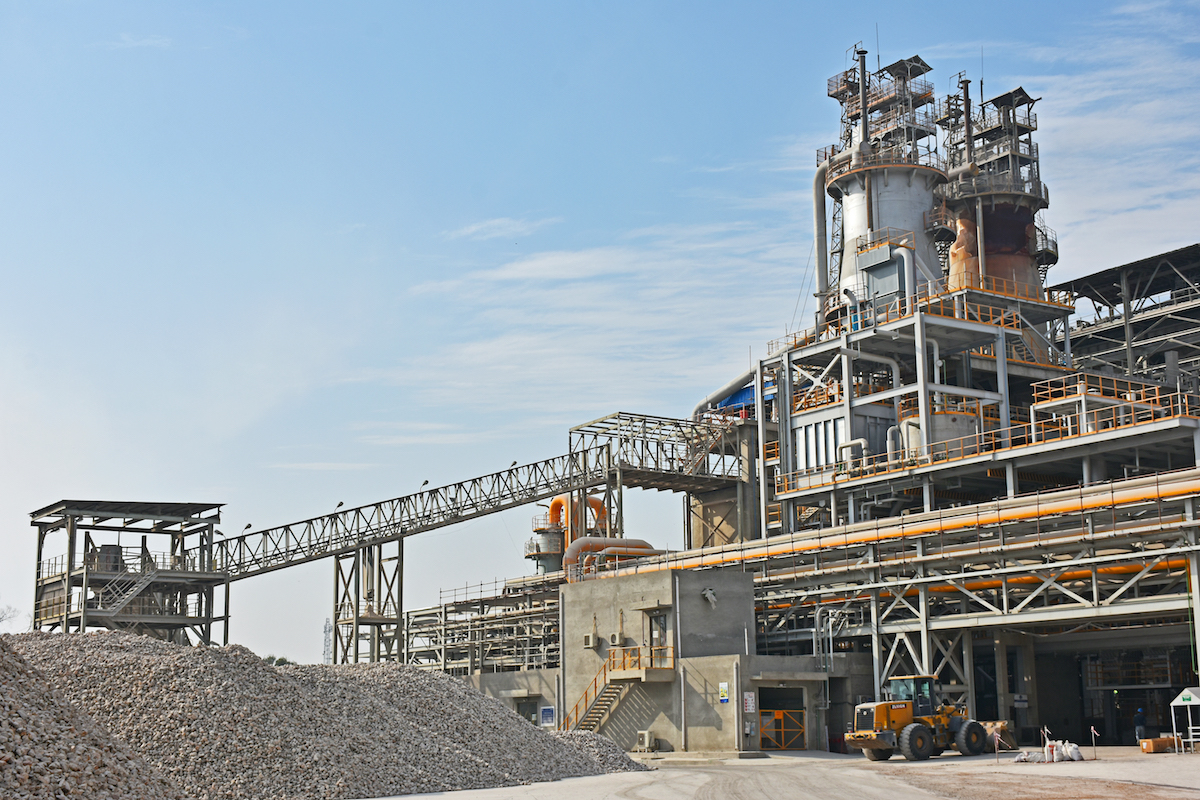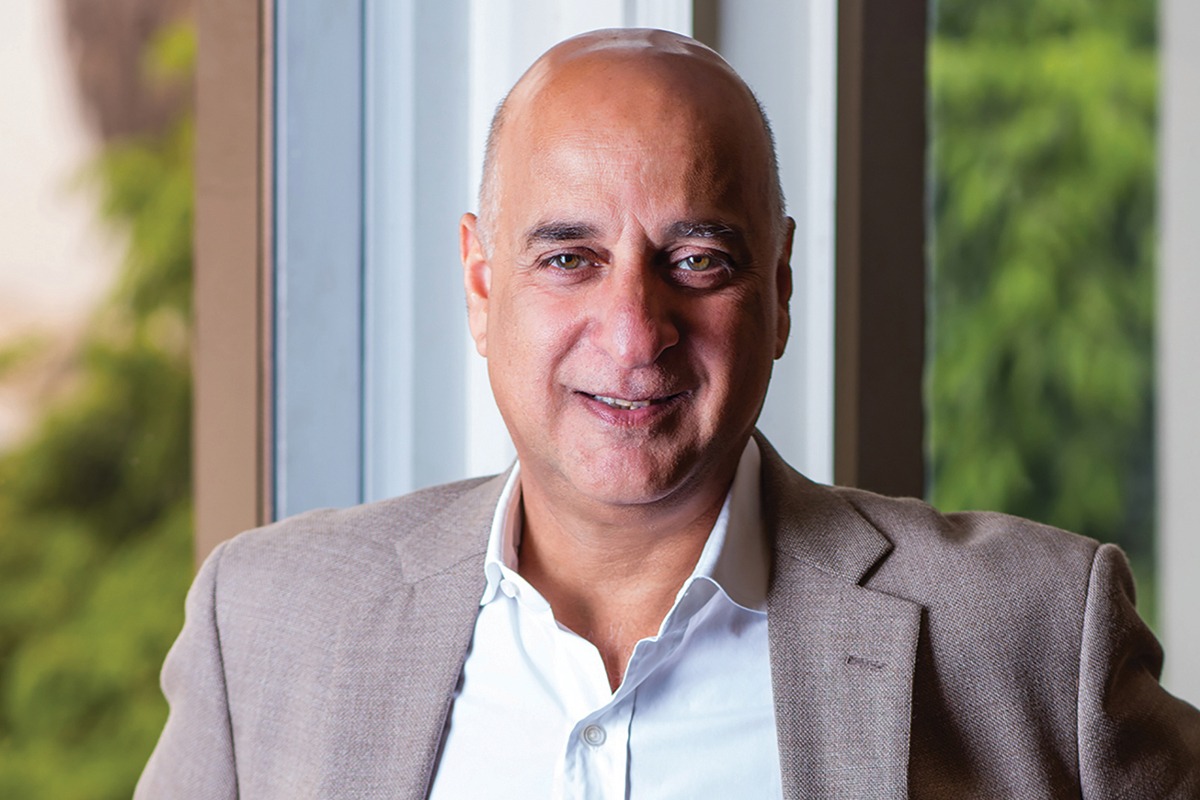As Asif Jooma, ICI Pakistan Ltd’s Chief Executive tells it, the company has been “very much
a part of the fabric and landscape of Pakistan”. Its roots stretch back to 1944, when its predecessor, the Khewra Soda Company, began operations as a local soda ash manufacturer, ideally located at the site of the world’s second largest salt reserve.
Asif sketches the history of the company, diversification and expansion from a manufacturing plant into a portfolio of businesses. The company changed its name to ICI Pakistan Manufacturers Ltd in the 60s, while also acquiring a shareholding in Fuller Paints, the predecessor to Paintex, and now AkzoNobel Pakistan. “ICI has been an exemplar for success among the multinationals operating in Pakistan.”
However, the growth of the company was not always linear. “In the more advanced stage of its life cycle, things came to a bit of an impasse,” Asif explains. “That was predominantly driven by business decisions that didn’t work favourably for the company, and also a significant shift in ICI Plc’s global strategy and position.”
Asif’s journey with the company
Asif’s own history at the company and his journey to the top job, began in 1983 when he joined ICI Pakistan Ltd as a Management Trainee after completing a degree in Development Economics at the University of Boston. He then progressed through numerous commercial roles and a stint in HR, prior to being appointed Vice-President Commercial for ICI Pakistan’s PTA Business, where he had broad responsibility for purchasing, technical services and logistics.
After more than two decades at ICI Pakistan Ltd, Asif left in 2006 and joined Abbott Laboratories Pakistan, a multinational with interests across nutrition, diagnostic equipment and pharmaceuticals. As Managing Director, Asif led them to double-digit growth in both top-line and earnings.

In his absence, ICI Pakistan Ltd was acquired by AkzoNobel, a Dutch paint and chemical company. Two years later, AkzoNobel demerged its paints business into a separate legal entity, AkzoNobel Pakistan. This, Asif says, was the first step towards AkzoNobel’s divestment of ICI Pakistan Ltd’s legacy businesses.
“So, ICI immediately undertook a program of divestment of its non-core assets,” Asif recalls. “The first thing they did was sell the purified terephthalic acid (PTA) business to Lotte. Just prior to that, PTA had been a major contributor to weakening the balance sheet of ICI Pakistan Ltd (which had previously always been rock solid). Because of the timing, and given the vulnerability and vagaries of the petrochemical cycle, the company found itself under financial stress.”
The return
Meanwhile, Asif was watching these developments from a distance and felt that ICI Pakistan Ltd needed to be revitalised. “If you looked at the performance and growth of the company, it was coasting. It needed resources and to be infused with a sense of purpose and drive.”
Despite holding a well-remunerated and secure role at Abbott, Asif’s thoughts turned to how he could help his old company and build his legacy in the industry. “I thought: Do I continue as Managing Director of this multinational and at the end of my career, simply hand the mantle over to my successor? Or do I want to look back and know I left an indelible mark on the corporate sector of Pakistan by rebuilding an institution that future generations of managers, leaders and analysts throughout the region will aspire to join? ICI was a singular opportunity. I knew the business, and I knew it was a sleeping giant that needed to be woken up.”
I knew the business, and I knew it was a sleeping giant that needed to be woken up.
Part of this latent potential was the strong corporate brand equity of ICI Pakistan Ltd that helps attract top-tier talent; it’s a level of brand awareness generally seen in much larger companies. “There is instant recognition of ICI everywhere you go. It has really penetrated deep into the country’s economic and business landscape.”
The influence of the company’s leadership on the nation’s corporate landscape has been substantial, Asif explains. “At ICI, we have been leaders in human capital and » leadership development in Pakistan.
A scan of the corporate landscape is evidence of this.” At one point, Pakistan operations for Mobilink, GlaxoSmithKline and Abbott were all led by ex-ICI Pakistan Ltd chief executives.
Asif highlights the 2012 acquisition of ICI Pakistan Ltd by the Yunus Brothers Group, a Pakistan-based conglomerate with interests in textiles, manufacturing, real estate and alternative energy, as the turning point.
At this juncture, Asif returned to the company. He says the transition to the new ownership group was smooth. “Nobody was asked to leave. Regrettably, the first thing that usually happens after an acquisition is that top people are asked to leave. But at ICI, anyone who left did so of their own volition. Not only did we value and retain existing talent, we provided resources and empowerment for them to achieve their goals and aspirations.”
Plans for pharmaceuticals
The pharmaceuticals sector is experiencing rapid growth in Pakistan and was worth PKR324 billion in 2016–17, an increase of 16% relative to the previous financial year. ICI Pakistan Ltd has plans to capitalise on this trend, setting an objective of ranking among the top five pharmaceutical companies in the country within five years. This project should be right in Asif’s wheelhouse, his having previously guided Abbott to the number two position in the field. Abbot also ranked as the country’s fastest-growing pharmaceutical company when Asif was Managing Director.

ICI Pakistan Ltd was originally involved in pharmaceuticals purely as a distributor through a historic partnership with Anglo-Swedish company AstraZeneca. It has since made acquisitions with a view to gaining a foothold in manufacturing, which Asif believes is a necessary step towards credibility as a long-term player in the sector. One of these acquisitions was a local pharmaceutical company which owns a war chest of unlaunched brands to further consolidate its presence in this competitive market.
The largest segment in the pharmaceuticals market in Pakistan is branded generics and Asif acknowledges that growth in this sector will require patience. “You’ve got to have the stomach to ride the headwinds from time to time,” he reflects.
“I think for us, keeping on the right side of the challenge is a matter of diligently staying the course in commercial execution and brand development. When it comes to acute therapy and branded generics, it takes a long time to establish yourself. You might spend years building the brand, but when doctors become convinced of the proposition that your message presents, the adoption rate is relatively fast and ‘sticky.’”
Tough regulatory framework
Moving further into the pharmaceuticals sector means coming to terms with a rigorous regulatory framework. Asif says there is no room for complacency on safety and compliance in this field. “For us, as far as the integrity, responsibility and ethics in pharma are concerned, it’s like the difference between baseball and cricket. In baseball, you have three strikes before you’re out. Pharma is like cricket. When you’re bowled, you’re out. You don’t get a second chance.”
Pharma is like cricket. When you’re bowled, you’re out. You don’t get a second chance.
Despite the regulatory challenges, Asif says ICI Pakistan Ltd’s commitment to meeting these standards is a competitive advantage for the company. “We have implemented a strong approach on ethics and compliance across the organisation. At times, we have to grapple with more than we bargained for because we will not compromise. But in the end, it all becomes good. It really does count towards a more robust and enduring business model.”
So far, ICI Pakistan Ltd has enjoyed some success in the oncology sector, where it experienced 39% growth in the most recently concluded financial year. Particularly impressive was the performance of one drug it markets, Meronem, which achieved sales of more than PKR1 billion. The cardiology portfolio also experienced a boost after a reworked marketing campaign and grew by 12%. Another segment of its life sciences business, animal health, managed to achieve robust double-digit growth of 40% and there is scope for further growth as Pakistan’s meat and milk industries pick up.
Despite these positives, Asif insists that ICI Pakistan Ltd’s ambitions to gain prominence in pharmaceuticals represent only one part of its pathway to growth. “As a moderately diversified company, our success has come from our core competencies in manufacturing excellence, commercial execution and portfolio management. If you have a diversified business, portfolio management is very important. So, we are staying within the ambit of moderate diversification, but growing the portfolio.”
Diversity and growth
Asif discusses the company’s future with a measured confidence. He says it will look to expand its chemicals business and has recently announced investment in a facility in Karachi’s West Wharf to achieve this aim.
The factory will manufacture Masterbatch, a colourant and additive in pellet form that is widely used in plastics. “There are multiple areas in which we’re growing,” he adds. “But we also maintain our core by cultivating and strengthening our existing businesses.”
Asif has particular expertise working in the company’s polyester business. During a four-year spell as Vice-President where he oversaw polyesters, ICI Pakistan Ltd modernised its polyester plant to enhance fibre capacity and improve operational efficiencies. The sector became its highest top-line revenue contributor under his watch.
Lately, however, the market for polyester has become challenging as Chinese competitors resorted to dumping product into Pakistan. Asif says ICI Pakistan Ltd has resisted being drawn into the situation. “We’ve invested to ensure the business is robust and resilient. It has got to a point now where it can weather the storm of a highly unpredictable, cut-throat industry.”
Prices for polyester staple fibre were up and more black fibre was being sold. Trends suggested that overall, the polyester business grew 7% year on year. Growth was even more pronounced in the company’s life sciences and chemicals divisions (up 28% and 20% year on year, respectively), a trend credited to a broader customer base and new partnerships.
ICI Pakistan Ltd is always moving, and recently forged a partnership with Japan’s Morinaga Milk Industry Company, and local company Unibrands Private Limited, to invest in a facility for manufacturing infant formula in Pakistan. The partnership will include the distribution, marketing and sales of the formula and marks the first time Morinaga products will be manufactured in the country.
The company’s original business, soda ash, remains a key part of the portfolio. Still the leading domestic supplier of soda ash, it produces more than two-thirds of all soda ash used nationwide. Additionally, it is making significant inroads as an exporter into India and Afghanistan. In 2018, the company » completed a capacity expansion of its soda ash plant at its Khewra site, with the additional capacity of 75,000 tonnes per annum (TPA) taking the plant’s total capacity to 425,000 TPA, a quantum leap from the 18,000-tonne capacity of the original facility.
Pakistan’s golden decade
Despite mixed opinions on the country’s economy, the outlook for ICI Pakistan Ltd is strong. While Asif acknowledges that the country is in the midst of major political and economic upheaval, he is optimistic. “I still believe that this is going to be a golden decade for Pakistan. We have the foundations, the right people and significant investment coming into the country.”
Asif points to the investment in Pakistan that will occur as part of China’s ‘Belt and Road’ initiative. Around US$56 billion will be spent on infrastructure projects in the China–Pakistan Economic Corridor, significantly improving road and rail connectivity, installing new pipelines and alleviating port congestion. “These are all basic requirements for any developing economy,” Asif says.
Commerce in Pakistan has been hamstrung by regular power outages, but Asif believes the completion of a number of large-scale energy projects currently in progress will remedy this. He expects these improvements to the power supply to lead to an improvement of GDP by about 1.5%. The company also installed its own in-house power and steam systems to alleviate this problem. Asif points out that those most affected by Pakistan’s power shortages were not companies on the scale of ICI Pakistan Ltd.
“My view is that the small to medium enterprise sector is what really drives an economy. It’s businesses like the power loom operators in Faisalabad or the small sports goods manufacturers in Sialkot that suffer the most because they lack the financial capacity to generate power themselves.”
ICI Pakistan Ltd is not just waiting for large-scale infrastructure to be upgraded or for the national economy to pick up. Asif says it is looking inward and ensuring it gets its mix of assets right, which will be vital to the company’s ongoing success.
People make it happen
Any business strategy is only as good as the people who execute it, so ICI Pakistan Ltd has invested heavily in both its staff and its external stakeholders. Customers are of course critical, with customer centricity being one of the company’s five core values. Asif says the secret to productive, long-term relationships with suppliers is counterintuitive; not thinking of them as suppliers. Instead of viewing raw material procurement as a transaction between buyer and seller, he says a company should aim for a relationship between equals.
“When you view them as partners, you acknowledge that you must have both coexistence and co-prosperity. We think of those relationships as vertical. The idea of coexistence is important to us. If you have a major consumer item you use in your transformation process, you ideally have multiple suppliers because that will give you comfort and assurance in terms of reliability and competitiveness.”
For people to make change happen, you have to provide the necessary space and freedom.
Asif says ICI Pakistan Ltd’s partnerships with suppliers are multidimensional. “It’s like a jigsaw that you want to put together and get right. You want to orchestrate your move so as not to throw anyone off track. At the end of the day, it’s the people who are critical. Whatever you may say about digital technology, incremental innovation or even disruptive innovation, it is still the people who make it happen.”
Communities too, are vital. ICI Pakistan Ltd has always maintained a strong focus on community investment, and through its CSR program, continues to support people in local communities with initiatives in health, education and environmental conservation. With successful projects such as the Hamqadam Community Clinic in Khewra proving to be valuable additions to local infrastructure, there is no doubt that community investment is the way forward.
Asif returns to the idea of empowering staff. “For people to make change happen, you have to provide the necessary space and freedom to take action; to experiment without fear of failure. If everyone could boast getting every decision right, the world would be a very different place. Our brand promise, cultivating growth, is at the core of everything we do, be it business strategy, talent management or our CSR efforts.”
Joining forces with Gallup
Many companies talk about improving culture and increasing staff satisfaction, but ICI Pakistan Ltd has taken concrete steps to measure this, joining forces with Gallup to introduce an employee engagement survey. The first results in 2015 showed the company at the thirty-fifth percentile. By 2017, it had soared to 4.3 out of five, which ranked it in the sixty-eighth percentile. A number of initiatives have been introduced to foster teamwork and boost morale, including fully equipped gym facilities, special event celebrations with colleagues and family members, sporting events for staff, team away-days and more.
The company’s Leadership Development Road Map offers customised training modules as well as executive coaching. The last financial year saw over 30,000 man-hours invested in employee training. The company also introduced ‘Race to the Boardroom’, a digitalised, gamified graduate recruitment tool designed to appeal to millennials. Asif says it’s a winning blend of talent both nurtured in-house, and hand-picked from outside the company to fill particular gaps in expertise.
“I think we’ve been very fortunate to operate in an environment which is reflective of our values and part of our DNA. We try and bring in a balance of institutional entrepreneurship. We believe in giving our people enough space and time to be entrepreneurs, yet also providing a structured environment. I’m extremely lucky to work alongside a great team.”



